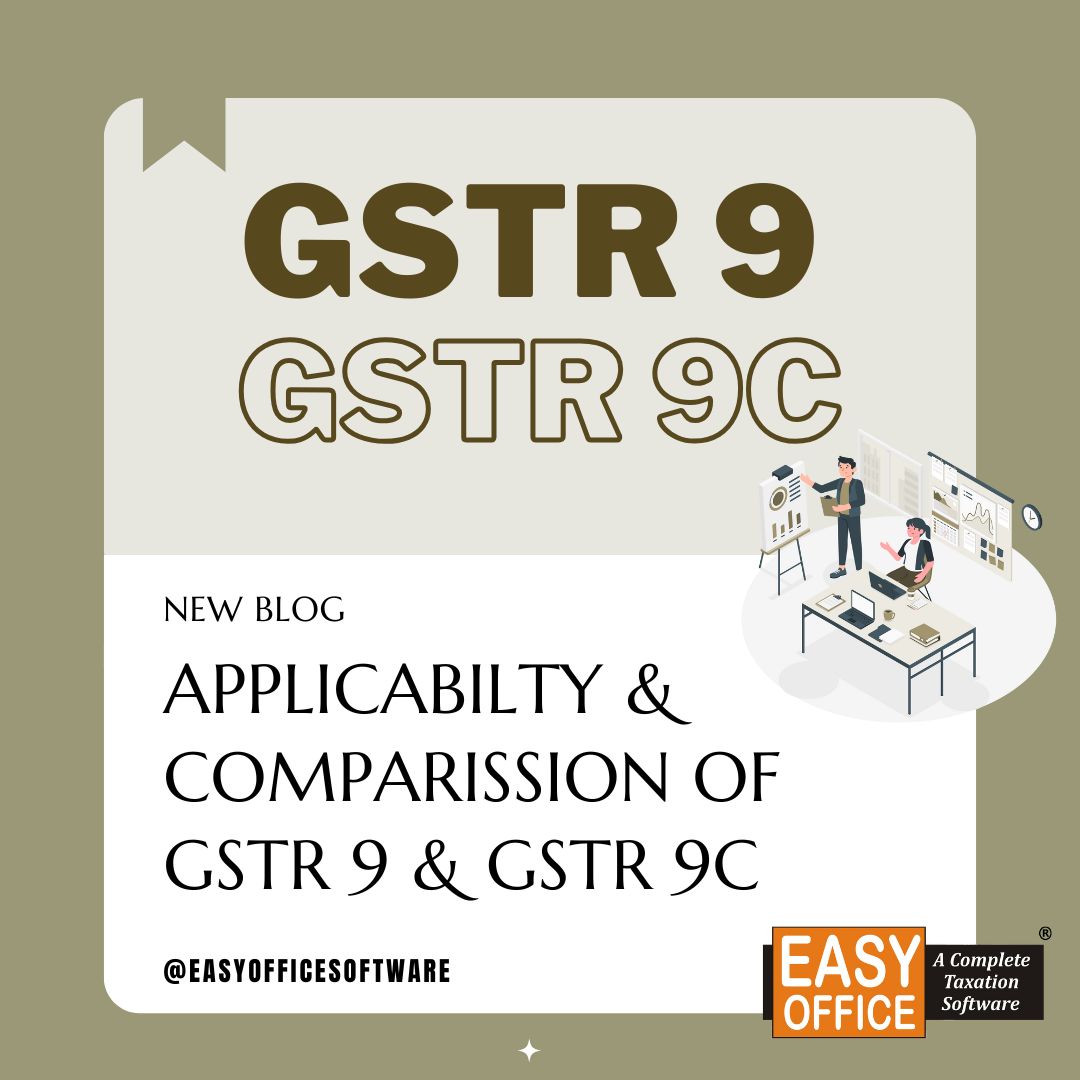
The goods and services tax regime in India has been a transformative solution in the taxation landscape of the country. It had created a unified system which has simplified the indirect tax compliance. For the small and medium sized enterprises, it is important that they ensure compliance with the law and avoid any form of penalties and audits through the proper return of the GST.
In this article, we will simplify and discuss two of the main GST returns that need to be filed annually for every financial year; GSTR-9 and GSTR-9C . These returns are critical for ensuring GST compliance, and we'll look into their purpose, eligibility, due dates, and filing requirements in an easy-to-understand manner. Whether you're a business owner, Chartered Accountant, or tax professional, this guide will help you navigate through the annual filing process with ease.
Form GSTR-9 is an annual return to be filed by registered taxpayers in GST for every financial year
Form GSTR-9C is a reconciliation statement to be furnished by the taxpayer whose aggregate turnover is above a specified limit, during a financial year.
A Comparative view of GSTR 9 & GSTR 9C for better and easy understanding of Annual compliances
Understanding GSTR 9 Annual & GSTR 9C Audit Return Forms
Feature |
GSTR 9 (Annual Return) |
GSTR 9C (Audit Return) |
| Purpose | Consolidates details of all returns filed during the year | Acts as a reconciliation statement for audit purposes |
| Applicability | Mandatory for all regular taxpayers under GST. Turnover up to 2 Cr > Optional More than 2 Cr - 5 Cr > Mandatory More than 5 Cr > Mandatory | Mandatory for businesses with an annual turnover exceeds Rs. 5 Crore Turnover up to 2 Cr > Not Required More than 2 Cr - 5 Cr > Not Required More than 5 Cr > Mandatory |
| Not applicable to |
|
|
| Data Included | Details of outward and inward supplies, ITC, and tax paid | Reconciles GSTR 9 with the audited financial statements |
| Certification Requirement | No certification required; filed by the taxpayer. | Required to furnish Self certified Reconciliation statement Note - Earlier required certification by a Chartered Accountant or Cost Accountant. |
| Filing Deadline | Due by December 31st of the following financial year unless extended i.e. 31St December 2024 for F.Y. 2023-24 | 31st December of following financial Year Note - GSTR 9C has to follow the GSTR-9 annual return |
| Late Fee & Penalty | Minimum of Rs 50 per day (Rs 25 each under CGST and SGST Act) Maximum up to 0.04% of taxpayer turnover (0.02% each under CGST and SGST Act) | No specific provision, Hence, subject to a general penalty of Rs 25,000 |
| Complexity | Relatively simpler and focuses on summarizing data. | More complex as it involves detailed reconciliation and audit. |
Free Demo of EasyGST Software for filing Annual Return with Ease
Delayed/ Non Filing of Annual Return (GSTR – 9):
| Aggregate Turnover in Relevant F.Y. | Late Fee Per Day | Maximum Late Fee (Based on Turnover in State/UT) |
| Up to Rs. 5 Crore | Rs. 50 per day (Rs. 25 CGST + Rs. 25 SGST/UGST) | 0.02 % of turnover each under CGST and SGST/UTGST |
|
More than Rs. 5 Crore
Up to Rs. 20 Crore |
Rs. 100 per day (Rs. 50 CGST + Rs. 50 SGST/UGST) | 0.02 % of turnover each under CGST and SGST/UTGST |
| Above Rs. 20 Crore | Rs. 200 per day (Rs. 100 CGST + Rs. 100 SGST/UGST) | 0.25 % of turnover each under CGST and SGST/UTGST |
How EasyGST Software Simplifies GSTR-9 and GSTR-9C Filing
- Auto Fetch Data : Feed data from GSTR-1 and GSTR-3B, reducing manual effort.
- Seamless Reconciliation : Identifies discrepancies between Portal Data & Books data along with GST returns and Audited financials.
- Pre-Filled Data : Automatically populates GSTR-9 and GSTR-9C with available data.
- Single-Click Filing : Simplifies submission with a user-friendly interface.
- On Screen Preparation : Direct data view button of GSTR 3B/2A/2B/1/Purchase & Sale
- On Screen Preparation : Direct data view button of GSTR 3B/2A/2B/1/Purchase & Sale
Conclusion
It is very important that you know how to file the accurate GST return because it is the cornerstone of a business financial compliance strategy. For the SMEs to manage all the resources effectively, it will need the right amount of manpower, but at the age of automation it is always advisable that you use the right software that can simplify the working process. So, to ensure your business is not getting into any form of penalties, EasyGST is the best GST return software. The above distinctions between GSTR 9 and GSTR 9C can help you understand the way better and stay tax compliant.
Most Frequently Asked Question:
1. What is the Turnover limit for filing Form GSTR 9 & GSTR 9C?| Turnover | GSTR-9 Filing | GSTR-9C Filing |
| Up to ₹2 crore | Optional | Not Required |
| Above ₹2 crore | Mandatory | Not Required |
| Above ₹5 crore | Mandatory | Mandatory |
- CMP-08 (Quarterly Statement for Tax Payment)
- GSTR-4 (Annual Return)

